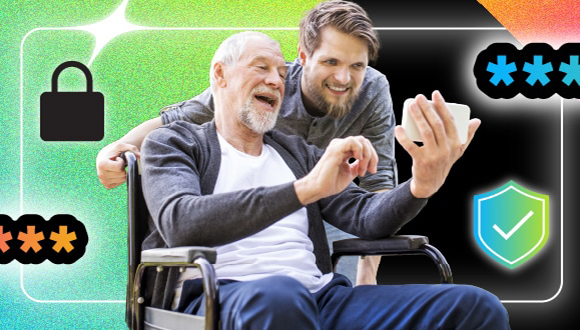Imagine: it's 9:59 am, and your favourite artist's concert tickets are going on sale at 10 am. You log in easily, click "Book Now" and you're in. No fumbling for login credentials, and no forgotten password reset thanks to your password manager. That's the benefit of good account security: it doesn't just protect you from cyber threats, it also makes life easier for future you — whether it's buying tickets, filing taxes, or quickly logging into a meeting on a busy day.

The first week of Cyber Month is all about learning how to protect your accounts now to save yourself time, stress, and even money in the future.
Passphrases, passwords, and password managers
Passwords and passphrases are your first line of defence when it comes to protecting your accounts. They should be unique to each account and complex. Passwords should be at least 12 characters long and include random numbers and characters. Passphrases are made of four or more random words, at least 15 characters; they're easier to remember and harder for attackers to guess. It's best to use a strong passphrase when possible.
Let's face it: no one can memorize dozens of strong and unique passwords or passphrases. That's where trusted password managers come in. These tools store your credentials securely, so you don't have to remember them — helping when you need to sign in quickly, book a flight, or file important information all while staying secure. This week, we'll discuss how to create strong passwords and passphrases, how to choose the best password manager for your needs, and how it can make things easier in the future.
Multi-Factor Authentication
Multi-factor authentication (MFA) adds an extra layer of security to your accounts by requiring a second verification step when you log in. This means you'll get a notification when an attempt is made to log into your accounts, meaning you have more control over who has access to them. MFA comes in many forms and can be a one-time use PIN sent to your phone, an authentication app that requires you to confirm your identity, a token, or biometrics like your thumbprint.
MFA can dramatically reduce the risk of losing your account credentials. This week, we'll discuss different ways to use MFA and how it protects you when you might need it the most.
Social media account security
Your social media accounts are part of your digital identity. They're a great way to share your life and stay in touch with friends and family, but if you're not careful, they can also be an easy way for cyber criminals to access your information. Taking precautions before you post, like limiting who can see your information, disabling location sharing when you aren't using it, and managing your account settings, can go a long way in protecting your privacy.
Protecting your accounts with strong, unique passwords, enabling MFA, and keeping apps and devices updated can also help keep you safe. This week, we'll discuss securing your social media accounts and how simple steps can help protect your identity now and later.
Looking ahead
Take a moment today or this week to review your accounts. With a few simple steps, your future self will thank you. Learn more about passwords and passphrases, password managers, MFA, and social media by following along throughout Cyber Month.